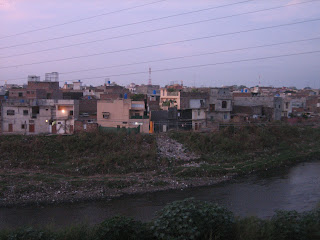Inspired by Charles Dickens' "The Streets - Morning" from Sketches by Boz.
The surroundings resonate with the beautiful rendition of the Islamic
call to prayer for the first prayer of the day. The single voice calling
"Allahu Akbar" (Allah is Great) is soon joined by a multitude of
other voices, some old and some young, until the words are barely discernible. In
the semi-darkness of pre-dawn, the Nala Lai looks like a smaller version of
River Thames (as my brother likes to put it), reflecting tiny lights from the
surrounding houses which seem to be poised precariously close to the edge
despite several warnings after floods in the past to move them back. As the sky
begins to lighten very gradually in the cold December morning, dark shapes,
which a wild imagination turns into beings from another land, start presenting
their true forms as mundane unimaginative products of modern technology.
As I start taking photos of the sunrise, the bright orange on the
horizon that stays its beautiful self in every part of the world, I'm struck, as
always, by the contrast in my surroundings. As I look down from the front side
of my house, other than the guard heating himself infront of the flames of his
personal little bonfire and an occasional wandering stray cat or dog, the
well-kept neighbourhood of retired army officers is engulfed in slumber and
serenity. This side of my house hardly ever held my attention for long. The
backside of my house, however, where the Nala Lai stretches out in all its
filthy granduer (the piles of garbage accumulated along its banks are now
visible in the morning light), the world across it has always interested me.
The stark contrast that both sides of the Lai present is fascinating if
not sobering. The garbage that decorates the bank of the "other" side
gradually transforms into a confusion of houses of various sizes, which seem to
be interconnected - no sign of any open space let alone a garden. Some housing
poor families moved here from nearby cities earning their livelihoods by
working at the well-to-do houses across the Nala. It is, however, also the
perfect hideout for our friendly neighbourhood thieves. Won't we know it,
having been victims to one such gang!
As I take pictures of the cement bridge that stretches over one end of
the Lai, an occasional car or two drives across. The bridge always reminds me
of the bomb blast which was attempted to kill our former President Musharraf,
who would frequent the famous bridge while going back and forth from the Army
House in the heart of Rawalpindi. As I move my camera lens back to the houses
across, I see a tiny speck with a large sack rummaging in the junk - a
scavenger in search of recyclable material, most likely. (Unfortunately, the photo was too blurred to be shared.) I now hear cars
starting up, as people start leaving for schools, colleges and workplaces.
As I pack up my camera and head downstairs upon
completing my mission of capturing pictures of the sunrise, I continue to think
about the two contrasting worlds on both sides of the Nala - sadly symbolic of
the large economic divide between the rich and the poor in my country.



